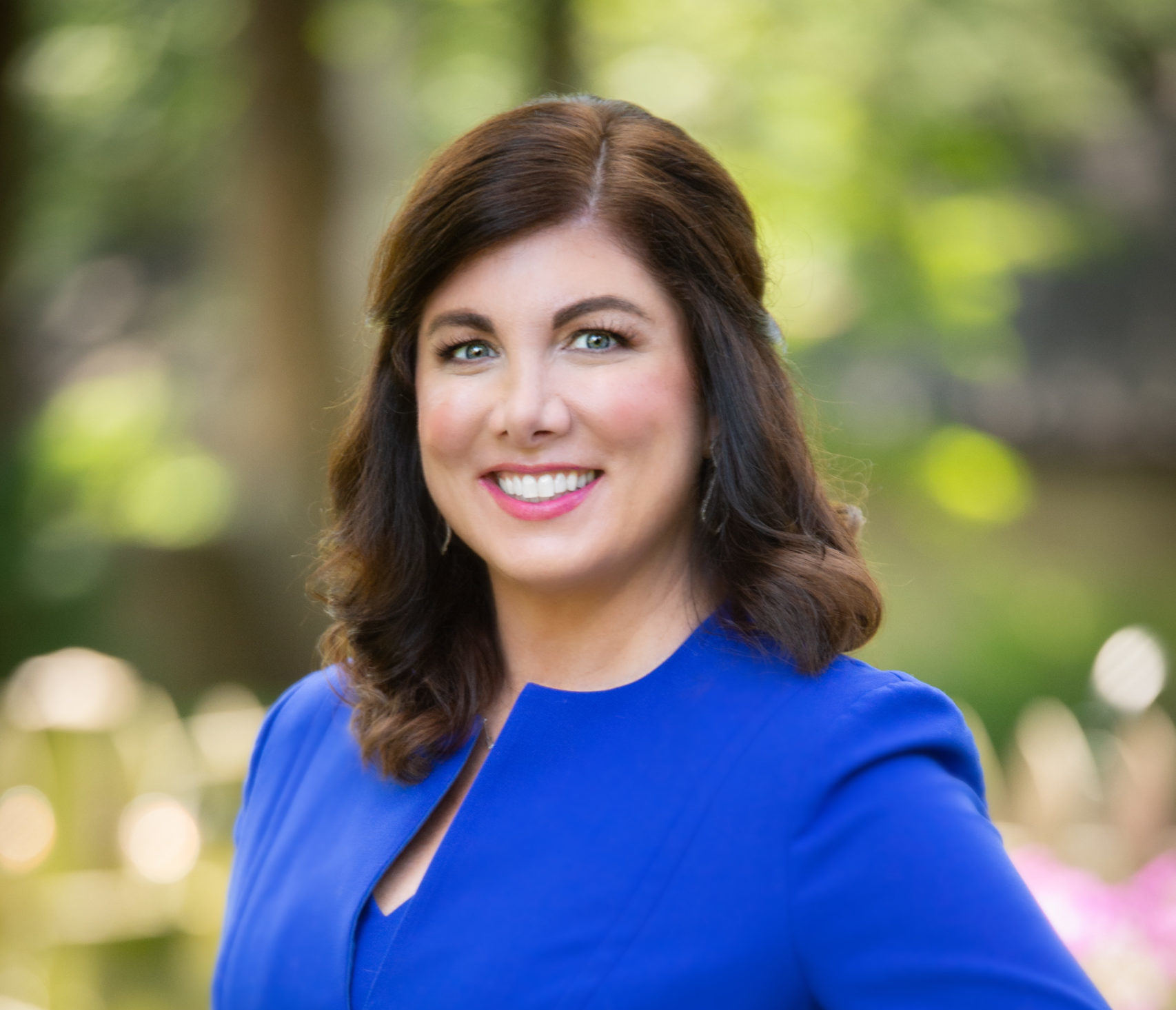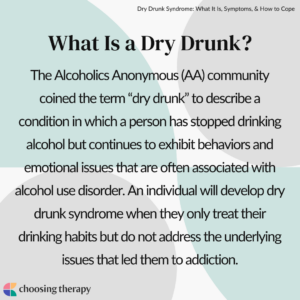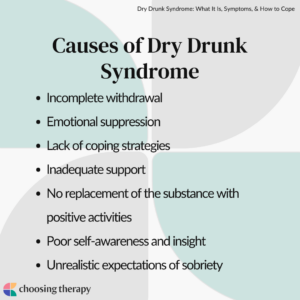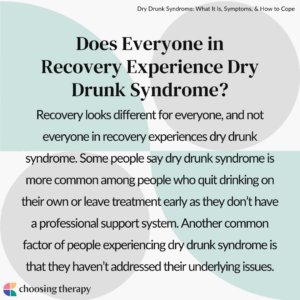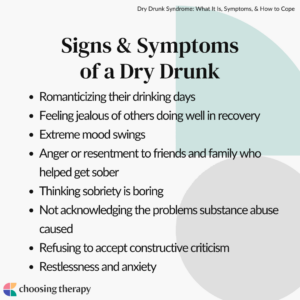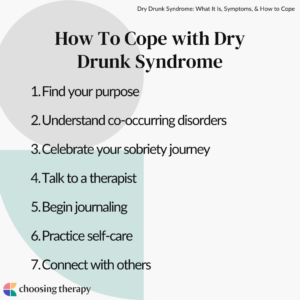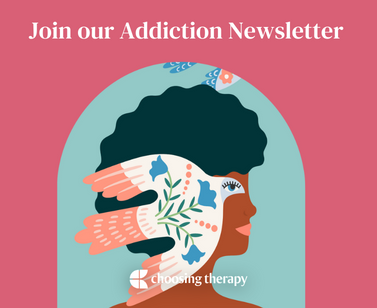Dry drunk syndrome describes someone who quits drinking but continues to show negative behaviors and emotions associated with active addiction. They haven’t dealt with the issues that initially caused their addiction. For people struggling with alcohol addiction, achieving sobriety is a significant milestone; however, they often don’t realize that just abstaining from alcohol doesn’t erase their troubles.
Mental health help for substance use disorder
Get help from a real doctor who takes insurance. Talkiatry offers medication management and supportive therapy in online visits with expert psychiatrists. Talkiatry believes that treating anxiety, depression, and other mental health conditions that commonly lead to or coexist with substance use disorders is a critical part of treating SUD. Take the online assessment and have your first appointment in days. Free assessment.
What Is a Dry Drunk?
The Alcoholics Anonymous (AA) community coined the term “dry drunk” to describe a condition in which a person has stopped drinking alcohol but continues to exhibit behaviors and emotional issues that are often associated with alcohol use disorder. An individual will develop dry drunk syndrome when they only treat their drinking habits but do not address the underlying issues that led them to addiction.
People often associate dry drunk syndrome with post-acute withdrawal syndrome (PAWS). PAWS is a condition that occurs after the initial acute withdrawal period, typically lasting for several months or even years. It encompasses a range of physical, emotional, and psychological symptoms that can negatively impact somebody’s long-term recovery.
Is the Term “Dry Drunk” Stigmatizing?
Some argue that “dry drunk” is judgmental, stigmatizing, and perpetuates a negative understanding of addiction and recovery. Some critics believe that using the term “dry drunk” may discourage people from seeking help and hinder their sobriety by labeling them in a derogatory way.
In contrast, others believe “dry drunk” highlights the importance of active sobriety. Active sobriety refers to a state in which someone maintains abstinence from alcohol while actively working on their personal growth, addressing emotional challenges, and developing healthier coping mechanisms. Active sobriety typically involves participation in therapy, support groups, counseling, self-development work, or adopting healthier lifestyles.
Is Dry Drunk Syndrome a Sign of Relapse?
While dry drunk syndrome can be a red flag, indicating an increased risk of relapse, it doesn’t guarantee inevitable relapse. People with dry drunk syndrome are struggling to find healthy coping mechanisms to handle their stress and emotions. Without alcohol, dry drunks may find themselves ill-equipped to handle life’s challenges. Dry drunk syndrome is a crucial period where the alcoholic might resume destructive drinking or instead continue in sobriety.1 However, when people recognize and address the signs of dry drunk syndrome, they can take proactive steps to safeguard their sobriety and minimize the risk of relapse.
Causes of Dry Drunk Syndrome
One study reports that most recovering alcoholics who have maintained lengthy sobriety will experience dry drunk syndrome.2 Understanding the primary causes of dry drunk syndrome can shed light on why it occurs and help people in recovery navigate their journey more effectively. Note that the causes of dry drunk syndrome can change over time as the person in recovery may face new challenges.
Primary causes of dry drunk syndrome include:
- Incomplete withdrawal: Incomplete alcohol withdrawal might contribute to the person’s discomfort and impact the person’s emotional well-being. Dry drunk syndrome may serve as a way to deal with this discomfort.
- Emotional suppression: Trauma, grief, depression, anxiety, or relationship problems may have been masked or suppressed by alcohol. When somebody stops drinking, these unresolved emotional issues can resurface, leading to feelings of anger, frustration, and inadequacy.
- Lack of coping strategies: When recovering alcoholics stop drinking, they lose their primary coping mechanism, alcohol, and may be left feeling vulnerable and unsure of how to navigate life’s difficulties. Without learning healthy coping strategies, they may struggle to manage their emotions effectively, leading to dry drunk syndrome.
- Inadequate support: Alcoholism is a complex disease that requires ongoing support and treatment. Without a support system in place, people may struggle to cope with the challenges of sobriety and revert to negative behaviors. This lack of support can hinder their ability to address underlying issues and develop healthier coping mechanisms.
- No replacement of the substance with positive activities: Not only does successful recovery rely on abstaining from alcohol, but it’s also about adopting a lifestyle that supports overall well-being. Engaging in positive and fulfilling activities like hobbies can help fill the void left by substance use.
- Poor self-awareness and insight: An inability to recognize personal shortcomings, take responsibility for past actions or realize the need for ongoing personal growth can contribute to dry drunk syndrome. Without self-awareness and insight, people may continue to engage in self-destructive behaviors and exhibit negative attitudes and behaviors associated with alcoholism despite being sober.
- Unrealistic expectations of sobriety: Some people enter recovery with unrealistic expectations of what it means to be sober. They may believe that quitting drinking will solve all their problems and that life will automatically become perfect. When reality doesn’t align with their expectations, they may become disillusioned, frustrated, and angry.
Help for Alcohol Use Ria Health: Effective, Evidence-Based Alcohol Treatment 100% Online Quickly change your relationship to alcohol with our at-home program. On average, Ria Health members reduce their BAC levels by 50% in 3 months in the program. Services are covered by many major health plans. Visit Ria Health Recovery.com – Find the best local detox or rehab center covered by your insurance. Search our unbiased and thorough list of the best mental health and addiction treatment centers. Read reviews. Start Your Search Want to drink less? Sunnyside helps you ease into mindful drinking at your own pace. Think lifestyle change, not a fad diet. Develop new daily routines, so you maintain your new habits for life. Take a 3 Minute Quiz
Does Everyone in Recovery Experience Dry Drunk Syndrome?
Recovery looks different for everyone, and not everyone in recovery experiences dry drunk syndrome. Some people say dry drunk syndrome is more common among people who quit drinking on their own or leave treatment early as they don’t have a professional support system.3 Another common factor of people experiencing dry drunk syndrome is that they haven’t addressed their underlying issues.
Signs & Symptoms of a Dry Drunk
When people think of alcoholism, they often imagine someone who is intoxicated, stumbling, and unable to function in their daily lives. However, a dry drunk who has stopped drinking but has not yet fully embraced recovery can exhibit various signs and symptoms that indicate they are still struggling with their addiction.
Common signs and symptoms of a dry drunk include:
Romanticizing Their Drinking Days
Despite no longer drinking, a dry drunk may yearn for their past lifestyle, romanticizing their drinking days. They may reminisce about the positive aspects of their addiction while ignoring the severe consequences it brought into their life. They may downplay or justify their past drinking habits or actions, avoiding taking responsibility for the consequences of their addiction. This nostalgia may risk their recovery.
Feeling Jealous Of Others Doing Well In Recovery
A dry drunk may still struggle with feelings of low self-esteem and inadequacy. Seeing others succeed in recovery can highlight their own perceived failures or shortcomings, leading to feelings of jealousy. They also might have concerns about their ability to maintain their sobriety, and seeing the success of others makes them feel like they are falling behind.
In addition, dry drunks may be unintentionally comparing themselves and competing with other people struggling with addiction. They may view the achievements of others as a threat or evidence that they are not doing well on their own recovery journey.
Extreme Mood Swings
A dry drunk often struggles with managing their emotions and experiences chronic frustration. They may have experienced traumatic events or faced emotional challenges that they didn’t adequately address. These unresolved traumas can contribute to ongoing mood swings and emotional instability.
Alcohol often serves as a coping mechanism for people to deal with stress, emotional pain, or other difficult emotions. When someone stops drinking without establishing alternative coping strategies, they may still struggle to manage their emotions effectively, leading to mood swings.
Anger or Resentment to Friends & Family Who Helped Get Sober
Sometimes, friends and family members have high expectations for the person in recovery. They may put pressure on them to change their behaviors quickly or assume that they will immediately become a better person. This can create feelings of resentment for an individual with dry drunk syndrome because they feel overwhelmed or unable to meet these expectations.
Friends and family members may also have unknowingly enabled the addictive behaviors of the person before they entered recovery. Enabling can involve actions such as providing financial support or covering up the consequences of their substance abuse. A dry drunk might feel resentful toward their loved ones for not addressing or recognizing their role in the addiction sooner.
Thinking Sobriety Is Boring
Addiction often involves seeking thrill and excitement. Dry drunk syndrome can make a person feel that their life has become mundane and lacks excitement. Social isolation can also happen when people find it challenging to navigate social gatherings where there is alcohol or drugs. They may feel disconnected or left out, which can contribute to their boredom.
Not Acknowledging the Problems Substance Abuse Caused
Dry drunks may not have fully recognized or accepted their behavior while they were actively using substances. They may have been in denial about the extent of their addiction and the consequences it had on their lives and relationships. This lack of self-awareness can continue even in sobriety, making it difficult for them to acknowledge the problems they caused.
Because substance use disorder often leads to negative consequences such as damaged relationships, financial problems, legal issues, and physical or mental health issues, guilt and shame can be overwhelming. Acknowledging the problems caused by their substance use disorder may further intensify these feelings, leading some dry drunks to avoid facing the truth.
Refusing To Accept Constructive Criticism
Dry drunks may have a strong sense of ego, and criticism threatens their self-image and pride. Admitting fault or acknowledging the need for self-improvement can be challenging for them. They may remain in denial about the impact of their behavior on themselves and others.
Accepting constructive criticism requires vulnerability and openness. Dry drunks may have built emotional barriers as a coping mechanism during their drinking days. They fear being emotionally exposed or feeling weak if they accept criticism, which may stir up suppressed feelings or memories.
Restlessness and Anxiety
Anxiety is a common symptom experienced by people in recovery. A dry drunk may find it challenging to relax and constantly feel restless. They may seek out distractions or engage in addictive behaviors to numb their restlessness, such as excessive work, overeating, or engaging in risky behaviors. AA’s Big Book characterizes dry drunk syndrome as restlessness, irritability, and discontent.4
How To Cope with Dry Drunk Syndrome
While the physical dependency on alcohol may have been overcome, the emotional challenges and destructive behaviors associated with addiction can remain present, causing significant hardship to those in recovery and their loved ones. There are practical strategies to cope with its effects, which can help to sustain sobriety and emotional well-being.
Ria Health: Effective, Evidence-Based Alcohol Treatment 100% Online Quickly change your relationship to alcohol with our at-home program. On average, Ria Health members reduce their BAC levels by 50% in 3 months in the program. Services are covered by many major health plans. Visit Ria Health
Here are seven ways to cope with dry drunk syndrome:
1. Find Your Purpose
Finding your purpose can be an effective way to cope with dry drunk syndrome because it offers a sense of direction, meaning, and fulfillment, which can replace the void left by alcohol. Discovering your purpose provides a reason to stay motivated and focused on personal growth and recovery. It can help define your values and give you a sense of direction, providing a framework for building a fulfilling life without relying on substances.
2. Understand Co-Occurring Disorders
Depression and anxiety are common co-occurring disorders among dry drunks. Feelings of worthlessness, sadness, and hopelessness can intensify when someone is trying to maintain sobriety but is unable to find fulfillment in their everyday life. The fear of failure, the judgment of others, and the constant anxiety about the future can also cause significant distress, making it harder to treat dry drunk syndrome.
3. Celebrate Your Sobriety Journey
Celebrating your sobriety can be a powerful and effective way to cope with dry drunk syndrome. It can help by reinforcing positive behavior. It can act as a positive reinforcement for your commitment to a sober lifestyle. It reminds you of your progress and the strength it took to get there.
Celebrating your sobriety can help boost your self-confidence and self-esteem. It reminds you that you have overcome significant obstacles and have the ability to overcome future challenges. By acknowledging your achievement, you reinforce your belief in yourself and your ability to stay sober, decreasing the chances of falling into the negative mindset of a dry drunk.
4. Talk to a Therapist
Professional therapy can help you identify and address the underlying emotional issues that may be contributing to dry drunk behaviors. Finding a therapist who specializes in addiction can help you develop healthy coping mechanisms and strategies for managing stress and emotions to prevent relapse. Because a therapist is a trained professional who can provide personalized guidance and support tailored to your specific needs, they can help you explore deeper issues.
5. Begin Journaling
Journaling about your addiction recovery can be a helpful tool in managing and overcoming dry drunk syndrome. Journaling is a way to self-reflect and explore thoughts, emotions, and behaviors related to dry drunk syndrome. By writing about your experiences and reflecting on your triggers, cravings, and actions, you can gain a deeper understanding of your situation.
By regularly journaling, you can track your behaviors and identify patterns that contribute to dry drunk syndrome. Recognizing triggers and patterns in thoughts and actions can help develop strategies to avoid or manage these experiences more effectively. You can also write down specific recovery goals in your journal, making them more tangible and concrete.
6. Practice Self-Care
Practicing self-care in recovery can be extremely beneficial in managing the impact of dry drunk syndrome. Exercising regularly, adopting a balanced diet, and prioritizing sleep can have a positive impact on your physical health. These practices can help reduce stress, boost mood, and enhance overall energy levels, all of which can contribute to a healthier mindset.
7. Connect With Others
Connecting with a peer support group or substance use recovery group therapy can help with dry drunk syndrome. While group therapy aims to help people change behaviors, support groups can help people cope.
Support groups like Alcoholics Anonymous (AA), can also be instrumental in addressing dry drunk syndrome. AA provides people with a space to share their experiences, receive support, and learn from others who have been through similar struggles. Building a strong support network of sober friends and family members can provide a sense of community and understanding, helping people navigate the challenges of sobriety.
When to Seek Professional Support
If you feel like you are struggling with dry drunk syndrome, it could be beneficial to seek the help of a therapist. They can provide a proper evaluation and guidance based on the specific situation and individual needs. You can even find professional support for dry drunk syndrome by searching an online therapist directory or online therapy platform.
Mental health help for substance use disorder
Get help from a real doctor who takes insurance. Talkiatry offers medication management and supportive therapy in online visits with expert psychiatrists. Talkiatry believes that treating anxiety, depression, and other mental health conditions that commonly lead to or coexist with substance use disorders is a critical part of treating SUD. Take the online assessment and have your first appointment in days. Free assessment.
You may want to consider a psychiatrist who can prescribe various medications to treat addiction. There are online psychiatrist options that are a good choice for finding anger medication management. Other appropriate ways for someone to seek treatment are through addiction recovery apps like the Sunnyside App and Reframe.
Treatment Options for Dry Drunk
Coping with dry drunk syndrome requires active participation in personal growth and recovery. Therapies play a significant role in treating dry drunk syndrome and addressing the underlying causes of substance use disorder. Behavioral therapies can help modify attitudes and behaviors related to drug abuse.5
Treatment options for dry drunk syndrome include:
- Cognitive behavioral therapy (CBT): CBT for substance abuse is a helpful way to identify the connections between their thoughts, feelings, and behaviors, leading to enhanced self-awareness. Therapists work with clients to challenge negative thinking patterns and develop healthier coping mechanisms to avoid drinking.
- Dialectical behavior therapy (DBT): DBT is a form of CBT that helps people explore how and why they think the way they do and recognize self-destructive thoughts.
- Motivational interviewing: Motivational interviewing for substance abuse aims to enhance a person’s motivation to change their behavior by exploring and resolving any ambivalence they may have towards recovery. Motivational interviewing highlights personal values and goals, guiding people toward making positive choices.
- Dual diagnosis treatment: People with co-occurring disorders should consider dual diagnosis treatment. This type of treatment addresses both substance use disorders and mental health conditions simultaneously.
- Family therapy: Alcohol use disorder impacts the entire family unit. Family therapy can be helpful in addressing behaviors associated with dry drunk syndrome. While family members can be negatively impacted by a dry drunk, that person may be triggered by existing problems in family relationships.
- Alcoholics Anonymous (AA): AA offers structured support systems within a community of peers. These programs emphasize spiritual growth, self-reflection, and accountability, helping people embrace sobriety while fostering lifelong connections.
- SMART Recovery: SMART Recovery is a global community of people who are seeking support for addiction recovery. It stands for Self-Management and Recovery Training and is a science-based program that focuses on empowering people to overcome addictive behaviors.
In My Experience
To help our readers take the next step in their mental health journey, Choosing Therapy has partnered with leaders in mental health and wellness. Choosing Therapy is compensated for marketing by the companies included below. Alcohol Treatment – Cut Back or Quit Entirely Ria Health – Quickly change your relationship to alcohol with our at-home program. On average, members reduce their BAC levels by 50% in 3 months in the program. Services are covered by many major health plans. Visit Ria Health Drinking Moderation Sunnyside – Want to drink less? Sunnyside helps you ease into mindful drinking at your own pace. Think lifestyle change, not a fad diet. Develop new daily routines, so you maintain your new habits for life. Take a 3 Minute Quiz Detox or Rehab Center Covered by Insurance Recovery.com – Find the best local detox or rehab center covered by your insurance. Search our unbiased and thorough list of the best mental health and addiction treatment centers. Read reviews. Start Your Search Treatment for Mental Health Conditions That Coexist With SUD Talkiatry – Get help from a doctor who can treat the mental health conditions that commonly lead to or coexist with substance use disorders. Take our online assessment and have your first appointment in days. Take Assessment Addiction Newsletter A free newsletter for those impacted by addiction. Get helpful tips and the latest information. Sign UpAdditional Resources
Best Online Medication-Assisted Treatment Programs Online medication-assisted treatment programs are fairly new to the telehealth industry, but existing companies are expanding quickly with new programs emerging every day. It’s important to explore your options and understand the level of virtual care available so you can choose the best addiction treatment program for you.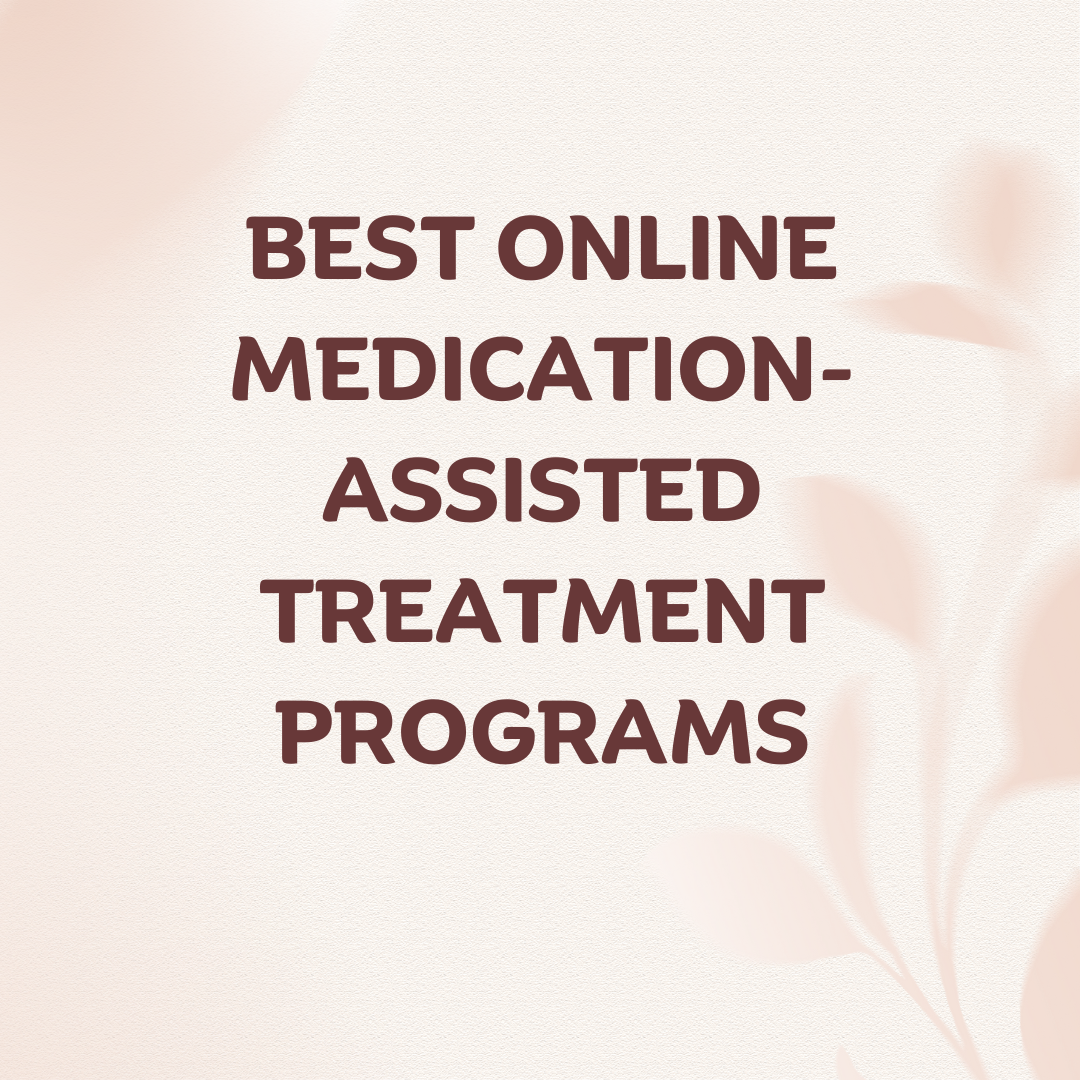
Best Mindful Drinking Apps If you’re thinking about joining the sober curious movement and you’d like to cut back on drinking, mindful drinking apps are a great place to start. Practicing mindful drinking can take some time, attention, and patience, but with the help of the right app, you can completely transform your relationship with alcohol.




